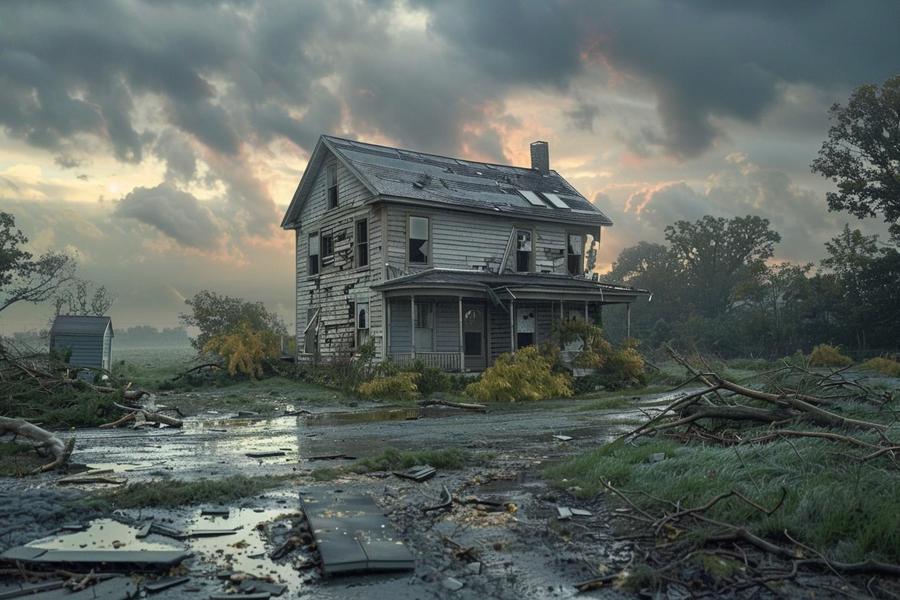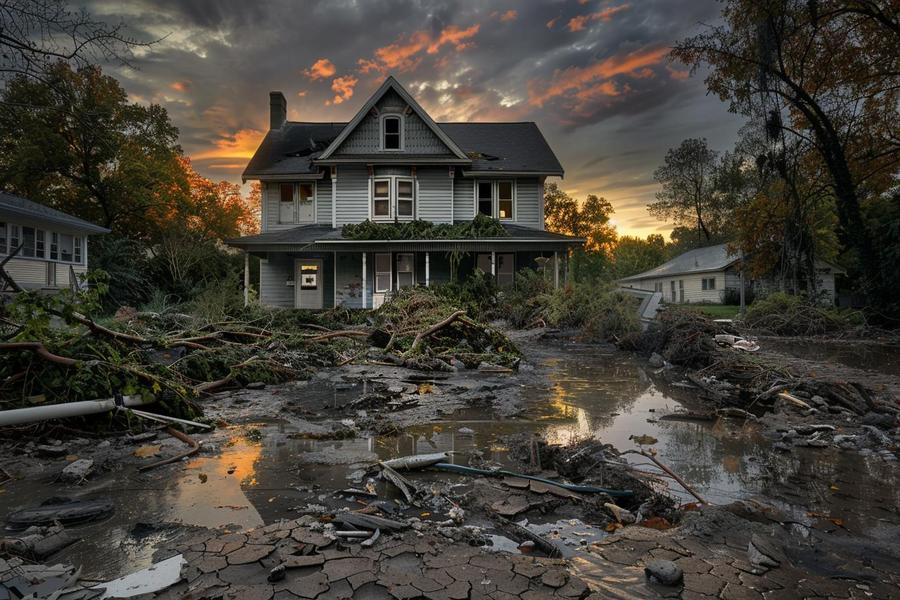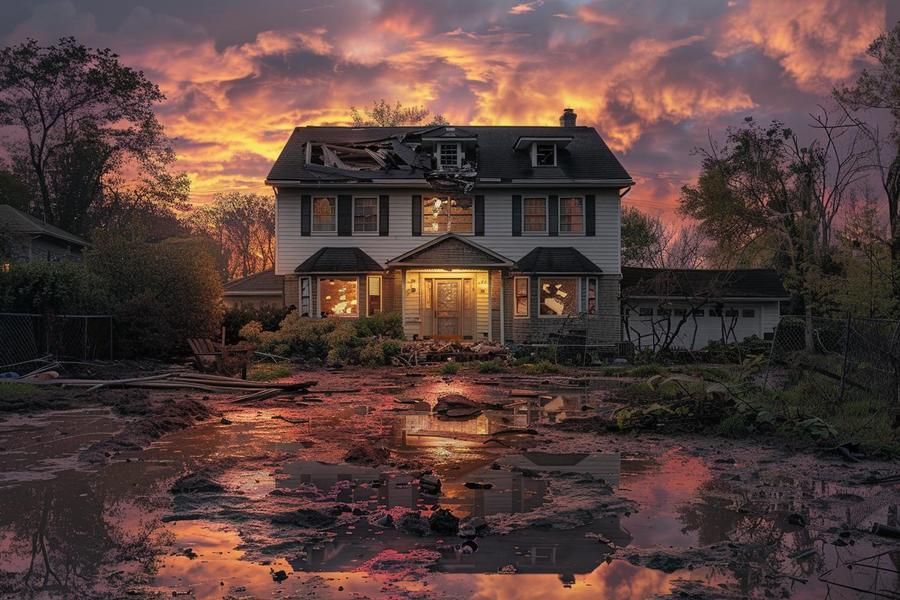If you’re thinking about selling a house with storm damage in Florida, you might feel overwhelmed. I get it. From hurricanes in Miami to tropical storms in Tampa, severe weather can leave behind costly repairs that seem impossible to tackle. But here’s the thing—you still have options. Whether you choose to fix the damage or sell as-is, this guide from Eagle Cash Buyers will walk you through each step. If you need a fast solution in your area, you can sell my house fast in Miami even after a major storm.
TL;DR:
- Storm damage can impact both value and safety.
- Insurance may cover repairs, but the claims process is often complex.
- Options include fixing up or selling as-is to cash buyers.
- Full disclosure is often required by law.
- Local market conditions influence your best strategy.

Common Home Damages Caused by Storms
Types of Damage Storms Can Cause
Florida storms don’t mess around. They’ll rip shingles off your roof, crack your siding, and send patio furniture through your sliding glass doors. High winds can turn a neighbor’s trash can into a projectile that dents your metal roof. And that’s just what you can see—water has a way of sneaking into places you’d never expect.
How to Assess Storm Damage
Start with the obvious spot—your roof. Missing shingles? Sagging sections? Those are red flags. Then work your way down. Check if your gutters are hanging by a thread or packed with debris from that oak tree next door. Windows might look fine at first glance, but run your hand along the frames to feel for drafts or moisture.
Here’s what I’ve learned works best:
- Grab a flashlight and check your attic for water stains (they usually show up as dark circles on wood)
- Make sure gutters actually drain—standing water near your foundation is trouble waiting to happen
- Feel around door and window frames for soft, spongy wood
- Take photos of everything before you touch anything (your insurance company will thank you)
Does Storm Damage Devalue a House?
Impact on Value
Let’s be honest—yes, it probably will. A compromised roof or foundation issues? Those tend to send buyers running. Even cosmetic stuff like missing shutters or a beat-up fence can make people think, “What else is wrong?” It’s not always fair, but that’s how buyers think.
Resale Challenges
Severe damage creates a domino effect. Buyers see dollar signs—and not the good kind. You might find yourself dropping your price by $20,000 just to get someone interested. Or worse, sitting on the market for months while your neighbors’ undamaged homes sell in weeks. A local agent can run the numbers on what similar damaged properties actually sold for, which might surprise you (sometimes in a good way, sometimes not).
Does Insurance Compensate for Storm Damage?
Navigating Claims
Most Florida policies should cover wind, rain, and hail damage. Should. But actually getting that money? That’s where things get tricky. You’ll need to report everything right away—waiting even a week can complicate things. The adjuster who shows up might seem helpful, but remember they work for the insurance company. Keep every receipt, even that $12 tarp from Home Depot.
Sometimes the check they cut barely covers half of what contractors quote you. It’s frustrating, but not uncommon. Check out this Forbes article on storm damage insurance claims if you want strategies for dealing with lowball offers.
Selling with an Open Claim
This gets messy. You have to tell buyers about the open claim—no way around it. Some buyers will wait it out, hoping for a bigger insurance payout. Others might walk away entirely. A few savvy ones will try to take over the claim themselves, though that rarely goes smoothly.
Can You Sell a Storm Damaged Home?
Absolutely. In fact, there’s a whole subset of buyers looking specifically for these properties. Cash buyers, in particular, don’t mind taking on a project. If timing matters more than top dollar, selling your house fast in Florida could save you months of headaches.
Selling As-Is: Pros and Cons
The upside? No contractor delays, no surprise costs when they find mold behind the drywall, no living in a construction zone. You’re done. The downside is pretty obvious—you’re leaving money on the table. Maybe $30,000, maybe more. In cities that see storms regularly, buyers might be more understanding. Then again, they might use it as leverage to lowball you.

What to Do Before Selling
Get a Home Inspection
I know it seems backwards—paying for an inspection when you already know there’s damage. But hear me out. That $400 inspection report gives you ammunition. It shows buyers you’re not hiding anything, and it might reveal that things aren’t as bad as they look. Or it could confirm your worst fears, but at least you’ll know. The Washington Post article on home inspections makes a good case for why sellers should consider this.
Repair or Not?
Small stuff? Maybe worth fixing. Replacing a few shingles or patching drywall could bump your price by $5,000 while costing you $500. But a new roof? That’s $15,000 that might only add $10,000 to your sale price. Run the math carefully—sometimes doing nothing is actually the smart move.
Options When Selling a Damaged House
Selling to Cash Buyers
Cash buyers in Tampa or Orlando can close in literally a week. They’ve seen it all—missing roofs, flooded basements, you name it. The catch? They’re not charities. Expect offers around 60-70% of what your house might fetch if it were pristine. Still, if you’re facing foreclosure or need to relocate for work, selling your house fast in Tampa beats letting it sit empty while hurricanes keep coming.
Working with an Agent
A good agent knows how to spin your situation. They’ll highlight the “great bones” and “opportunity for customization.” Some buyers actually prefer projects—they can renovate exactly how they want. This path typically means more money in your pocket, but also more time. We’re talking 60-90 days if you’re lucky.
Worked Pricing Example
Real numbers: Say your storm-damaged house could theoretically be worth $200,000 if pristine. The contractor quotes $50,000 for repairs. Going the traditional route, you might sell for $260,000 post-repairs. Sounds great until you subtract that $50,000 in repairs plus roughly $15,000 in agent fees and closing costs. You net $195,000, and that’s if everything goes perfectly (it never does).
A cash buyer offers $180,000 today, as-is. Yes, you’re giving up $15,000. But you’re also avoiding months of construction hassles and the risk that your contractor finds additional problems. For someone who needs to sell their house fast in Orlando, that trade-off might make perfect sense.
Disclosure Requirements
Florida doesn’t play around with disclosure laws. You have to tell buyers about any defects that could affect the home’s value or safety. “I didn’t know about the foundation crack” won’t fly if a reasonable person would have noticed it. Keep every piece of paper—repair estimates, insurance correspondence, contractor invoices. Better to over-share than end up in court six months later.

Seller Checklist
- Take photos of everything (use good lighting—phone cameras work fine)
- Actually read your insurance policy (boring but necessary)
- Get at least three repair estimates
- Consider that pre-sale inspection
- Make the repair vs. as-is decision based on actual numbers, not emotions
- Check what damaged homes in your neighborhood sold for recently
FAQ
Can I sell my house if it has hurricane damage?
You can, and plenty of people do. Florida buyers aren’t naive—they know storms happen. The key is pricing it right and being upfront about what needs fixing. Some investors actually prefer damaged properties because there’s less competition from regular buyers.
Will my insurance premium go up after a claim?
It might. Insurance companies tend to view claims as red flags, especially large ones. Your premium could jump 20% or more. If you’re already thinking about selling, this could tip the scales—why pay higher premiums on a house you don’t want to keep?
How long does an as-is sale take?
With a legitimate cash buyer? Seven to fourteen days isn’t unusual. No joke. They skip the mortgage process entirely. This speed is a lifesaver if you’re juggling two mortgages or need to start a new job across the country. Anyone looking to sell their house fast in Jacksonville should at least get a cash offer to compare.
Do I need permits for storm repairs?
In Florida? Almost certainly. Anything structural definitely needs permits—roofs, electrical, plumbing. Even some seemingly minor stuff requires paperwork. Your local building department can tell you specifics, but don’t skip this step. Unpermitted work can kill a sale later.
Can I negotiate with my insurance adjuster?
You’d better. Their first offer is rarely their best offer. Document everything, get your own repair estimates, and don’t be afraid to push back. If you’re getting nowhere, a public adjuster (who you pay) might help squeeze out more money, though they typically take 10-15% of whatever they recover.





